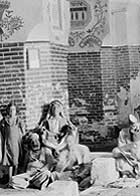Ezekiel's Tomb

Twenty-five centuries have passed since exiled Jews first wept for Zion by the waters of Babylon. Today only eight Jews are left in Iraq. Their story is not as well known as that of their European brethren, but in the Babylonian Talmud, for starters, Babylon-Iraq was home to the most influential post-biblical book in Jewish history. That it would become so was due to the Geonim, another extraordinary set of Iraqi rabbis who flourished in early Islamic times and whose most significant figure was Saadya ben Joseph (882/892–942).
After the Middle Ages, creativity extended outward as well, with Iraqi Jews founding other Jewish communities in India, Burma, and Shanghai. Not until 1941 did pogroms definitively shatter the peace of this cosmopolitan community, whose members would be largely expelled en masse after the establishment of the State of Israel.
Many of the books and records they left behind were secreted by Saddam Hussein's secret police, to be discovered, in terrible neglect, by the American army and taken to the U.S. for restoration. Today, even as some Iraqis go about razing Jewish tombs and pilgrimage sites, the state's national archivist wants these documents back, as reminders of his country's multiethnic past. A recent memoir by a Baghdadi-born Israeli scholar masterfully conjures up that past, and the distinctively Arab-Jewish identity it fostered.
Comments are closed for this article.




